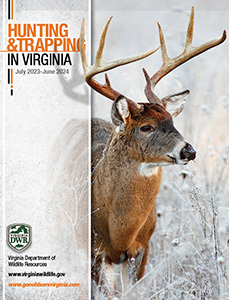Small Game Hunting
General Information
Legal Methods and Restrictions
Special restrictions apply to specific firearms use during this season. See Legal Use of Firearms & Archery Tackle, and Local Firearms Ordinances, Local Firearms, for details.
- Modern firearms.
- Arrowguns are allowed.
- Archery tackle.
- Muzzleloading firearms.
- Dogs may be used.
Crow
Season Dates
August 19 through March 15 on Mondays, Wednesdays, Fridays, and Saturdays.
September 1 through March 9
On National Forest Lands and Department lands on Mondays, Wednesdays, Fridays, and Saturdays only.
- Crows are a federally regulated migratory species; however, no HIP registration is required and hunters may use unplugged shotguns to hunt them.
- Electronic calls may be used on private and public lands. Written permission of the landowner is not required to hunt crows with electronic calls, except when hunting on posted property.
Groundhog
Season Dates
Continuous open season on private lands.
- Groundhog hunting on National Forest lands and Department lands is permitted from September 1-March 10 and during the spring turkey season.
- Groundhog hunting is permitted during the spring squirrel season on Department lands that are open for spring squirrel hunting.
- Groundhog hunting is not permitted on National Forest lands during the spring squirrel season.
Grouse
Season Dates
October 28 through February 10: west of I-95.
Continuous closed season: east of I-95.
Bag Limit
Three per day.
Quail & Pheasant
Season Dates
November 11 through January 31
Quail is closed on all public lands west of the Blue Ridge Mountains.
Bag Limits
Quail: six per day.
Pheasant: no daily or seasonal bag limit.
Rabbit
Important Regulation Additions, see “Attention Rabbit Hunters”.
Season Dates
November 4 through February 29
Bag Limit
Six per day.
Squirrel (Gray, Red, Fox)
Bag Limit
All squirrels combined–six per day.
Fall Seasons
Gray and Red Squirrels: September 2 through February 29
Statewide.
Fox Squirrels: September 2 through January 31 in the following designated areas only:
Counties west of the Blue Ridge and in the counties of Albemarle, Bedford, Culpeper, Fauquier, Franklin, Greene, Henry, Loudoun, Madison, Orange, Patrick, Prince William, and Rappahannock.
Spring Season
June 1 through 15, 2024: Closed on National Forest lands.
During the Spring Season:
Gray and red squirrels may be harvested statewide, unless otherwise posted, and on the following WMAs: Amelia, Big Survey, Big Woods, Briery Creek, Cavalier, Chickahominy, Clinch Mountain, Crooked Creek, Dick Cross, Doe Creek, Fairystone (including Fairystone State Park and Philpott Reservoir), Featherfin, Gathright, Goshen, Hardware River, Havens, Hidden Valley, Highland, Hog Island (Carlisle Tract only), Horsepen, James River, Lake Robertson, Lands End (Salem Church tract only), Little North Mountain, Mattaponi, Mattaponi Bluffs, Merrimac Farm, Oakley Forest, Pettigrew, Phelps, Powhatan (including the Goochland Tract), Rapidan, Short Hills, Stewarts Creek, G. Richard Thompson, Robert W. Duncan, Turkeycock Mountain, Ware Creek, and White Oak Mountain.
Fox squirrels may be harvested on all lands, unless otherwise posted, in all counties with an open fall fox squirrel season and on the following WMAs: Big Survey, Clinch Mountain, Crooked Creek, Gathright, Goshen, Havens, Hidden Valley, Highland, Lake Robertson, Little North Mountain, Merrimac Farm, C. F. Phelps, Rapidan, Short Hills, Stewarts Creek, G. Richard Thompson, and Turkeycock Mountain.
Hunting Preserves
Pen-raised game birds may be taken on licensed hunting preserves from September 1 through April 30, including Sundays. A list of hunting preserves open to the public may be obtained at the Department’s Henrico office or at www.virginiawildlife.gov. A resident hunting on a licensed hunting preserve is required to have a hunting license. A nonresident is required to have either a nonresident hunting license or a special nonresident hunting (shooting) preserve license which is valid only within the boundaries of licensed hunting preserves.

